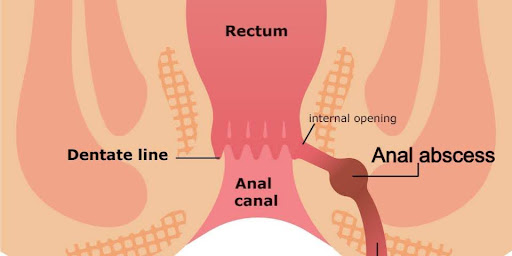If you’ve been experiencing pain, swelling, or discharge near your anus, you might be dealing with an anal fistula — a condition that can be uncomfortable and worrying. Anal fistula, also called fistula in ano, is a small tunnel that forms between the inside of your anus and the skin around it. It often happens when an infection in the anal glands doesn’t heal properly and creates this abnormal connection.
Understanding anal fistulas, their symptoms, causes, and treatment options can help you get timely care and avoid complications. In Hyderabad, many patients trust Dr. K V Dinesh Reddy, an expert GI surgeon, for advanced and minimally invasive anal fistula treatments.
What Are the Symptoms of Anal Fistula?
- Swelling or irritation of the skin around the anus
- Sharp, throbbing pain during bowel movements, sitting, or movement
- Foul-smelling discharge, sometimes mixed with pus, stool, or blood
- Occasionally, you may also experience fever, chills, fatigue, pain while urinating, or difficulty controlling bowel movements
What Causes Anal Fistulas?
- Sexually transmitted infections or tuberculosis
- Inflammatory bowel diseases such as Crohn’s disease or colitis
- Chronic diarrhea
- Radiation therapy, especially after rectal cancer treatment
How Are Anal Fistulas Diagnosed?
Doctors start with a physical exam to check for openings or swelling around the anus. To get the full picture, additional tests may be needed, including:
- Using a thin probe to trace the fistula path
- Anoscopy to see inside the anal canal
- Injecting hydrogen peroxide to locate internal openings
- Imaging tests like MRI or ultrasound
- Colonoscopy or sigmoidoscopy if inflammatory bowel disease is suspected
These tests are done under anesthesia to keep you comfortable and pain-free.
Types of Anal Fistulas
Anal fistulas are categorized based on their relationship with the anal sphincter muscles, which control bowel movements. The main types are:
- Intersphincteric
- Transsphincteric
- Suprasphincteric
- Extrasphincteric
Your doctor will identify the type to recommend the most effective treatment.
Treatment Options for Anal Fistula
Anal fistulas usually don’t heal on their own, so treatment is important to avoid recurring infections or complications. Treatments vary based on the fistula’s location and complexity:
Surgical Treatments:
- Fistulotomy: Opening the fistula tract to allow healing — best for simple fistulas near the skin surface.
- Endorectal Advancement Flap: Removing the fistula and covering the internal opening with healthy tissue.
- Seton Procedure: Placing a thread to keep the fistula open for drainage, often used for complex cases.
- LIFT Procedure: Cutting and closing the fistula tract between sphincter muscles while preserving function.
- Laser Surgery: A minimally invasive option using laser energy to close the fistula tract with less pain and faster recovery.
Non-Surgical Options:
- Fibrin glue or collagen plugs can seal the fistula without cutting, suitable for select cases.
Why Early Treatment Matters
Delaying treatment can lead to repeated infections, painful abscesses, or multiple fistula branches. Getting prompt, expert care improves healing and helps you return to a pain-free life sooner.
When to See a Doctor?
If you notice persistent pain, discharge, or swelling near your anus, don’t wait. Early evaluation can prevent complications and guide the right treatment.
Meet Dr. K V Dinesh Reddy — Expert Anal Fistula Surgeon in Hyderabad
Dr. Dinesh Reddy specializes in advanced GI surgery with over a decade of experience. He uses the latest minimally invasive techniques, including laser surgery, to offer effective and comfortable fistula treatment tailored to your needs.
If you’re concerned about symptoms or need expert advice on anal fistula treatment, booking a consultation with Dr. Reddy can help you take the first step toward relief.
Frequently Asked Questions
Can anal fistulas heal without surgery?
Anal fistulas rarely heal on their own. Without proper treatment, they may cause recurring infections and complications, so surgical intervention is usually necessary.
How long does it take to recover after anal fistula surgery?
Recovery time varies depending on the procedure but typically ranges from a few weeks to a couple of months. Minimally invasive options like laser surgery often have faster recovery.
Is anal fistula surgery painful?
Some discomfort after surgery is normal, but pain is usually well-managed with medications. Minimally invasive techniques tend to cause less pain compared to traditional surgery.
Can anal fistulas recur after treatment?
While surgery aims to completely heal the fistula, recurrence can happen, especially in complex cases. Proper follow-up and care reduce the risk of recurrence.
Who is the best doctor for anal fistula treatment in Hyderabad?
Dr. K V Dinesh Reddy is a leading GI surgeon in Hyderabad offering advanced and minimally invasive anal fistula treatments. Book an appointment today.


